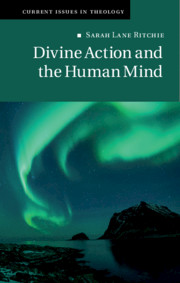Book contents
- Divine Action and the Human Mind
- Current Issues in Theology
- Divine Action and the Human Mind
- Copyright page
- Dedication
- Contents
- Acknowledgements
- Part 1 Divine Action and the Hard Problem of Consciousness
- Part 2 The Theological Turn
- 6 Naturalism(s) and the Theological Turn
- 7 Theistic Naturalism Part 1
- 8 Theistic Naturalism Part 2
- 9 Theistic Naturalism Part 3
- 10 Conclusion
- Bibliography
- Index
9 - Theistic Naturalism Part 3
A Pneumatological Assist
from Part 2 - The Theological Turn
Published online by Cambridge University Press: 02 August 2019
- Divine Action and the Human Mind
- Current Issues in Theology
- Divine Action and the Human Mind
- Copyright page
- Dedication
- Contents
- Acknowledgements
- Part 1 Divine Action and the Hard Problem of Consciousness
- Part 2 The Theological Turn
- 6 Naturalism(s) and the Theological Turn
- 7 Theistic Naturalism Part 1
- 8 Theistic Naturalism Part 2
- 9 Theistic Naturalism Part 3
- 10 Conclusion
- Bibliography
- Index
Summary
This chapter examines what can be called “pneumatological naturalism,” and concludes this three-part section on theistic naturalisms and divine action in the mind. The goal of Part 2 of this book has been to explore the various ways in which specific versions of theistic naturalism render different approaches to divine action and what it means to be natural – these models then serve as theological frameworks for understanding divine action in the naturalised mind. My argument in Part 2 so far has been that while these varying theological approaches differ in their respective emphases and methods of handling the causal joint problem, they hold in common a similar understanding of the God–nature relationship (and, indeed, the God–mind relationship), at least insofar as divine action is concerned. More specifically, it is argued that Thomism, panentheistic naturalism, and pneumatological naturalism share an affirmation that God’s active, immanent presence is inherent in any fully naturalistic account. Put differently, these theistic naturalisms reject standard causal joint models of divine action because of these models’ arguably deistic presumptions that nature is, by default, autonomous, self-sufficient, and devoid of divine activity. Theistic naturalisms instead offer models of divine action in which natural processes – and particularly the mind – are not seen as competing with divine action, but as participating with God in a fully natural manner.
- Type
- Chapter
- Information
- Divine Action and the Human Mind , pp. 298 - 341Publisher: Cambridge University PressPrint publication year: 2019

